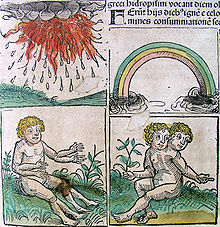
Back Voorbode Afrikaans الطالع Arabic Omen Czech Varsel Danish Omen German Οιωνός Greek Omeno Esperanto Presagio Spanish Enne Estonian اومن (فال) Persian
This article needs additional citations for verification. (April 2008) |


An omen (also called portent) is a phenomenon that is believed to foretell the future, often signifying the advent of change.[2] It was commonly believed in ancient times, and still believed by some today, that omens bring divine messages from the gods.[3]
These omens include natural phenomena, for example an eclipse, abnormal births of animals (especially humans) and behaviour of the sacrificial lamb on its way to the slaughter. Specialists, known as diviners, variously existed to interpret these omens. They would also use an artificial method, for example, a clay model of a sheep liver, to communicate with their gods in times of crisis. They would expect a binary answer, either yes or no, favourable or unfavourable. They did these to predict what would happen in the future and to take action to avoid disaster.[3]
Though the word omen is usually devoid of reference to the change's nature, hence being possibly either "good" or "bad", the term is more often used in a foreboding sense, as with the word ominous. The word comes from its Latin equivalent omen, of otherwise uncertain origin.[4]
- ^ "The Heavens - World Treasures: Beginnings - Exhibitions - Library of Congress". loc.gov. 29 July 2010.
- ^ Princeton. "Omen". Retrieved 8 March 2011.
- ^ a b Beck, David Noel Freedman ed. ; associate ed. Gary A. Herion, David F. Graf, John David Pleins ; managing ed. Astrid B. (2009). The Anchor Yale Bible Dictionary. New Haven: Yale University Press. ISBN 9780300140057.
{{cite book}}: CS1 maint: multiple names: authors list (link) - ^ Online Etymology Dictionary. "Omen". Douglas Harper. Retrieved 8 March 2011.